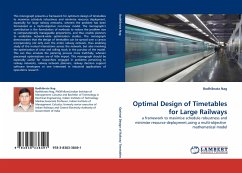
Ramsey Pricing by Railways
In historical and international perspective
Versandkostenfrei!
Versandfertig in 6-10 Tagen
39,99 €
inkl. MwSt.

PAYBACK Punkte
20 °P sammeln!
Passage of the US Staggers Act opened the way to Ramsey pricing by US railroads. Similar developments in Canada led to 'Ramsey pricing' by Canadian railways as well. Although this pricing method is believed to be new, it is so only in name. Such demand-based pricing is here shown to have been the norm in many countries and at many times in the past. By putting railway rates in the context of spatial economics, the author gets beyond previous discussion of whether railway rates were based on cost or the value of service and shows how both those factors were considered in setting 'Ramsey prices'...
Passage of the US Staggers Act opened the way to Ramsey pricing by US railroads. Similar developments in Canada led to 'Ramsey pricing' by Canadian railways as well. Although this pricing method is believed to be new, it is so only in name. Such demand-based pricing is here shown to have been the norm in many countries and at many times in the past. By putting railway rates in the context of spatial economics, the author gets beyond previous discussion of whether railway rates were based on cost or the value of service and shows how both those factors were considered in setting 'Ramsey prices' from the earliest times on. The analysis is supported by extensive empirical tests of unregulated and regulated freight rates charged in the USA at the end of the XIXth and beginning of the XXth centuries. By the same author: Argentine Railways, Seven Papers on their Economics and History, ISBN 978-0-9811096-1-9; Who was Who in Argentine Railways, 1860-1960, ISBN 978-0-9811096-0-2.












